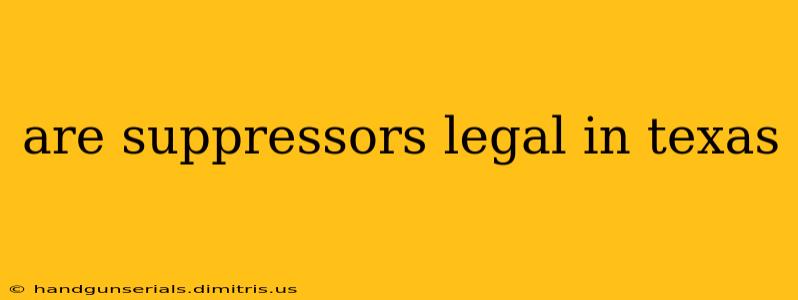The legality of suppressors, often mistakenly called silencers, in Texas is a complex issue with nuances that require careful understanding. While the short answer is yes, suppressors are legal in Texas, the process of obtaining and owning one is subject to federal and state regulations. This guide will clarify the legal landscape surrounding suppressor ownership in the Lone Star State.
Understanding Federal Regulations
Before diving into Texas-specific laws, it's crucial to acknowledge the overarching federal regulations governing suppressors. Under the National Firearms Act (NFA) of 1934, suppressors are classified as National Firearms Act (NFA) items. This means they are heavily regulated at the federal level, requiring a rigorous application process through the Bureau of Alcohol, Tobacco, Firearms and Explosives (ATF).
This process involves:
- Submitting ATF Form 4: This form requires detailed personal information, fingerprints, and photographs.
- Background Check: A thorough background check is conducted to ensure the applicant meets the eligibility requirements. This includes checks for felony convictions, domestic violence charges, and other disqualifying factors.
- Tax Stamp: A significant tax stamp ($200 as of October 26, 2023) must be paid to the ATF. This is a one-time fee for each suppressor.
- Waiting Period: There's a waiting period of several months (often several months) while the ATF processes the application.
Texas State Laws Regarding Suppressors
Texas law aligns with federal regulations concerning suppressors. The state doesn't impose additional restrictions beyond those mandated by the NFA. This means that once an individual successfully navigates the federal application process, they are legally permitted to own and possess a suppressor in Texas.
However, it's important to note that:
- Local Ordinances: Some Texas cities or counties might have local ordinances that further restrict the use or possession of suppressors. It's essential to check with your local authorities to determine if any such ordinances exist in your specific area.
- Responsible Ownership: Even with legal ownership, responsible handling and usage are paramount. Texas law mandates safe firearm handling practices, which apply equally to firearms equipped with suppressors.
The Myths and Misconceptions Surrounding Suppressors
Many misconceptions surround suppressors. It’s vital to dispel these myths for accurate and responsible gun ownership:
- Complete Silence: Suppressors significantly reduce the sound of a firearm, but they do not make it completely silent. The term "silencer" is a misnomer; a more accurate term is "suppressor" as they suppress, not eliminate, the sound.
- Automatic Approval: The ATF approval process takes time and is not guaranteed. Applicants must meet strict eligibility criteria.
- Restricted Use: While some jurisdictions may have additional restrictions on where suppressors can be used (e.g., hunting regulations), in Texas, the primary regulations pertain to acquisition and possession.
Conclusion: Navigating the Legal Landscape
Owning a suppressor in Texas is legal, provided you comply with both federal and local regulations. The process, however, is rigorous and requires patience and adherence to the ATF's procedures. Always prioritize responsible gun ownership and ensure you are fully aware of all applicable laws before acquiring any NFA item. This guide offers a summary of the legal landscape; consulting with a legal professional specializing in firearms law is always advisable to ensure complete compliance.

